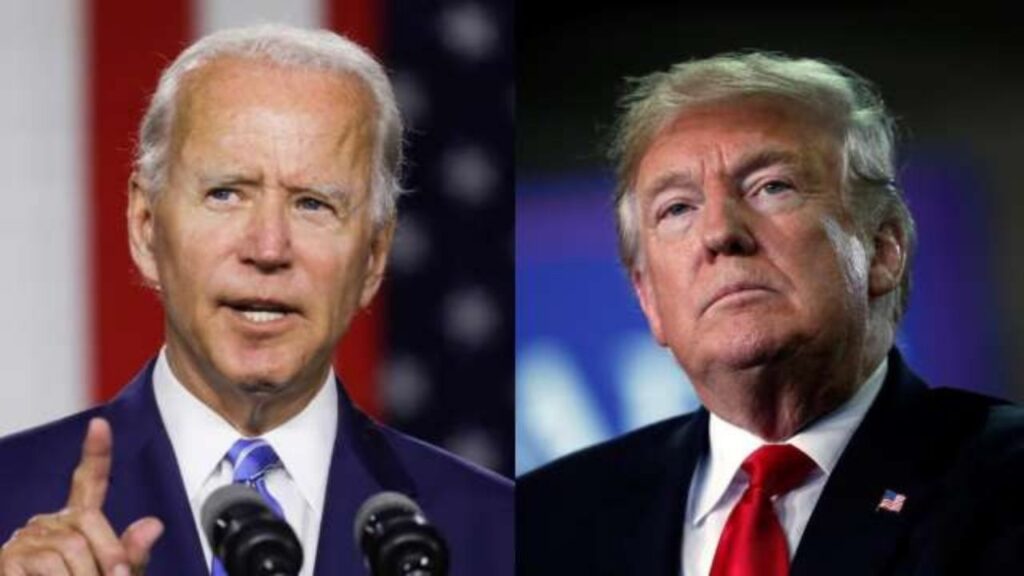Former President Donald Trump is emerging as a dominant force in the Republican presidential primary field, according to a recent poll conducted by Quinnipiac University. The survey revealed that Trump enjoys significant support among GOP and right-leaning voters, with 56% backing him for a potential presidential bid. In comparison, Florida Governor Ron DeSantis secured 25% support among the same group of voters.
The poll also indicated that other Republican primary candidates are trailing far behind, with former South Carolina Governor Nikki Haley receiving 3% support, and former Vice President Mike Pence, South Carolina GOP Senator Tim Scott, and former New Jersey Governor Chris Christie all polling at 2%. The remaining declared or likely candidates garnered less than 2% support.
In a head-to-head matchup for the GOP primary, Trump has widened his lead against DeSantis, with 61% support compared to DeSantis’s 32%. This marks a significant shift from March when Trump led with 52% support to DeSantis’s 42%.
However, when it comes to general election predictions, the poll suggests that Trump is trailing slightly behind President Joe Biden. Among registered voters, Biden maintains a narrow lead over Trump, with 48% favoring Biden and 46% favoring Trump. This two-percentage point margin remains unchanged since the last Quinnipiac poll.
In a head-to-head matchup against Biden, DeSantis narrowly edges out the president, with 47% support compared to Biden’s 46%.
The Quinnipiac University poll, conducted from May 18 to 22, surveyed 1,819 US adults, including 1,616 self-identified registered voters. The margin of error for the overall sample is plus or minus 2.3 percentage points, while the margin of error for Republican and Republican-leaning voters is plus or minus 3.8 percentage points.
The poll also highlighted concerns about the age of both candidates. Sixty-five percent of US voters believe Biden, aged 80, is too old to effectively govern for another term, including 90% of Republicans, 69% of independents, and 41% of Democrats. In contrast, 59% of voters believe Trump, aged 76, is not too old to effectively serve a nonconsecutive term, including 85% of Republicans, 55% of independents, and 42% of Democrats.
The survey revealed that a majority of voters hold unfavorable views of Trump (56%), Biden (54%), and Pence (51%). Trump, however, has a slightly higher favorability rating than Biden, with 40% of voters having a favorable view of the former president compared to 39% for the incumbent president.
Governor DeSantis garnered a 34% favorability rating, while 42% of voters held an unfavorable view of him. Haley, another potential Republican candidate, received a 19% favorability rating and a 27% unfavorability rating.
The poll also found differences in what voters prioritize in a presidential candidate. Republican voters and independents expressed a preference for a candidate who is a great leader, while Democrats preferred someone with great policy ideas.
Biden’s approval rating remains underwater, with 58% of voters disapproving of his leadership and 36% in support. Among registered voters, 57% expressed disapproval of Biden’s performance. The disapproval extends to his handling of Russia’s invasion of Ukraine (48%), foreign policy (54%), the economy (61%), and immigration issues (66%).
Overall, the poll offers valuable insights into the dynamics of the Republican primary field and the general election outlook, revealing Trump’s strong position among GOP voters while indicating a close race between Biden and DeSantis.
A significant majority of Americans, 68%, believe that the Biden administration has lost control of security at the southern border, according to recent findings. Only 20% of respondents feel that the situation is coming under control. This perception reflects concerns over the handling of immigration and border security issues.
Additionally, a substantial 71% of Americans express worries that President Biden may fail to reach an agreement with House Republicans regarding the nation’s debt ceiling, potentially leading to a default. This apprehension underscores the importance of bipartisan cooperation in addressing fiscal matters.
Opinions on responsibility for negotiations are divided, with 38% of Americans attributing it to President Biden and the Democrats, while 37% point to House Speaker Kevin McCarthy and the Republicans. The public’s divided perception suggests the complexities and challenges involved in reaching consensus on critical issues.
House Speaker Kevin McCarthy currently enjoys the highest approval rating among congressional leaders, with 35% of Americans supporting him. House Minority Leader Hakeem Jeffries receives a 34% approval rating, while Senate Majority Leader Chuck Schumer garners 33% approval. However, Senate Minority Leader Mitch McConnell receives the lowest approval rating at 20%.
Despite the approval ratings, significant proportions of the public also express disapproval of these leaders. McCarthy receives disapproval from 46% of Americans, Jeffries from 26%, Schumer from 47%, and McConnell from 64%. These figures highlight the polarization and varying opinions that exist regarding the leadership of these prominent political figures.
The data suggests a lack of consensus and ongoing debates surrounding crucial issues such as border security, debt ceiling negotiations, and the performance of congressional leaders. These findings underscore the challenges faced by the Biden administration and Congress in addressing the concerns and expectations of the American public.

